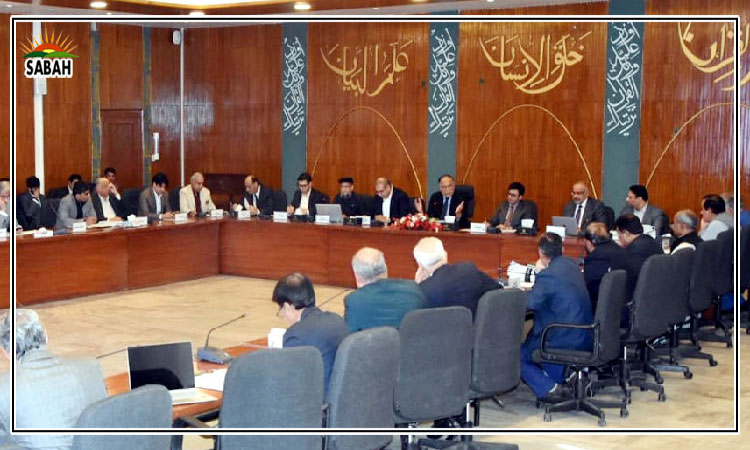How to protect children…Rida Tahir
Sexual violence is a heinous crime and a serious human rights violation. A report by the NGO, Sahil, reveals that from January to June 2023, a total of 2,227 cases of child sexual abuse and 53 cases of child pornography were reported across Pakistan.
About 12 children on average were subjected to sexual abuse every day during the period. Further, according to information revealed by the National Police Bureau (NPB), the total number of sexual violence cases registered in the country from 2019 till 2021 stands at 11,160.
The state is responsible for adopting protective mechanisms to combat sexual violence offences and prevent the recurrence of such heinous crimes by convicted or habitual offenders. Therefore, the recent notification (on September 13) of the Anti-Rape (Sex Offenders Register) Rules 2023 under the Anti-Rape (Investigation and Trial) Act 2021 by the Ministry of Law and Justice (MoLJ) is a step in the right direction.
A sex offenders register (SOR) is a mechanism used by several countries to monitor the activities of people convicted of sexual offences against children and adults. Here are some recommendations that can increase their effectiveness in tackling sexual offences.
The SOR is mandated under Section 24 of the Anti-Rape Act, which states that: The National Data-Base and Registration Authority (NADRA) shall prepare a register of sex offenders.
The definition for a sex offender is stipulated under Section 2(h) of the Anti-Rape Act as any person convicted under Sections 292A (exposure to seduction), 292B (child pornography), 292C (punishment for child pornography), 371A (selling person for purposes of prostitution), 371B (buying person for purposes of prostitution), 375 (rape), 375A (gang rape), 376 (punishment for rape), 377 (unnatural offences), 377A (sexual abuse), 377B (punishment for sexual abuse) of the Pakistan Penal Code (PPC) 1860 or Sections 21 (offences against the modesty of a natural person and minor) and 22 (child pornography) of the Prevention of Electronic Crimes Act 2016.
Even though the list is comprehensive, it is not clear if the SOR will include the details of those convicted for the offence of attempt or abetting a sexual violence offence.
Further, Section 2(h) does not include Section 354 (assault or criminal force to woman with intent to outrage her modesty) and 354A (assault or use of criminal force to woman and stripping her of her clothes). It also does not cover kidnapping or abduction of children or make references to the Trafficking in Persons Act 2018.
In Australia, for example, the Crimes (Child Sex Offenders) Act 2005 covers trafficking in children whether intentionally or reckless as to whether the child will be used to provide sexual services.
Turning to the SOR Rules, it is a brief document containing 17 rules and 4 (A-D) forms spanning across 14 pages.
According to Rule 3 (3), the SOR will be maintained by NADRA in electronic form and will not be accessed without express authorization as prescribed in the rules. The institution has been given the responsibility for the storage, protection, retention and destruction of the data in compliance with instructions issued by the Ministry of Law and Justice developed in consultation with the National Police Bureau and NADRA.
Further, Rule 4 provides guidelines on the information stored in the SOR. It includes: given name and surname, alias, fathers name, date of birth, gender, recent photograph, nationality, computerized national identity card number, POR card number or alien card number, passport number, FIR number with police station and district in which it was registered, fingerprints, history of DNA profiling, identifying marks, permanent and temporary address, specific offences for which the offender was convicted, conviction order duly certified by the court, acquittal order duly certified by the court, category of offender, description of the modus operandi of the offence and previous and current status of employment.
However, the rules do not include information regarding the address of the convicted persons place of employment or the type of employment, if the employment requires the care of children or vulnerable persons, landline or mobile telephone details, or information regarding the public places (such as parks, shops) he/she frequently visits, and details of any username for any online social networks. These are important details to keep children and vulnerable persons safe.
According to Rule 5(1), when an accused is convicted for a sexual offence, the special prosecutor appointed in the special court under the Anti- Rape Act, convicting the accused, will submit the completed Form A (provided in the rules) to the NPB for verification. The NBP will then submit the information received to NADRA electronically through the prescribed application programming interface for storage of data in the SOR.
Rule 5(3) requires that the entry into the SOR be made as early as possible but not later than 15 days of a person being convicted of a sex offence.
However, what is important to highlight is that requests for access to the SOR (through the district public prosecutor) can only be made for the purpose of investigation and prosecution according to Rule 6. Similarly, according to Rule 7 (2), The data shall only be stored in the sex offenders register for the specific purpose of investigation and prosecution of sex offences.
Rule 7(3) also states that all authorities with access to and applying for the release of data on the sex offenders registry shall only process it for the stated purpose.
According to the 2023 Cruel Numbers report by Sahil, 51 offences of child sexual abuse were committed by neighbours, 17 by schoolteachers, 15 by religious teachers, eight by shopkeepers, two by drivers and one by a school guard.
While the data on offenders should not be available publicly, it must be released to employers (such as schools, daycare centres, hospitals) with the aim to protect children and vulnerable persons. In the UK, for example, the police can tell parents, carers and guardians if someone has a record for child sexual abuse under the Child Sex Offender Disclosure Scheme (CSODS). The scheme is also known as Sarahs Law, after 8-year-old Sarah Payne who was murdered in 2000 by a convicted sex offender.
Similarly, in New Zealand, the Child Protection (Child Sex Offender Government Agency Registration) Act 2016 is applicable. While access to the register is not available to the public, the police may release information to an affected person (parent, teacher, or regular caregiver of the child) if it is believed that the registered offender poses a threat to the life, welfare, or sexual safety of children.
According to Rule 9(2), the convicted offenders in the SOR will be categorized in three categories: A, B and C. The notification will depend on the years of imprisonment that the offender has been punished with.
According to Rule 10, upon release from prison, the sex offender will notify the officer-in-charge of the police station where the offender resides within a period of three days of release from prison. The officer-in-charge of the police station will submit the completed Form B to the district police officer for onward submission to NADRA through the NPB for updating the SOR. This process shall be completed within 15 days, per Rule 10(2).
According to Rule 11, all offenders on the SOR must notify their details every six months to the police station of the area in which they reside.
Rule 13 requires the offenders on the SOR to notify their concerned police station not less than seven days in advance of any intended domestic travel and within 30 days in advance of any international travel.
According to Rule 16, if a successful appeal is filed after the conviction, which results in an acquittal, the previous conviction record will be omitted from the sex offender register. The conviction order will be omitted from the SOR upon the death of the offender, as per Rule 16(2). However, the rules do not provide details on the procedure which will be followed where an appeal against the conviction is pending in the courts.
It is important to outline that the SOR does not provide the procedure for registering the conviction of a citizen in a jurisdiction outside of Pakistan or the procedure of registration that will be followed upon the deportation of a citizen convicted of a sexual offence.
Finally, under Rule 17, the special committee has been given the responsibility to oversee the implementation of the SOR Rules. Overall, the notification of the rules is an excellent effort by the Ministry of Law and Justice for the protection of children and vulnerable persons.
Courtesy The News












